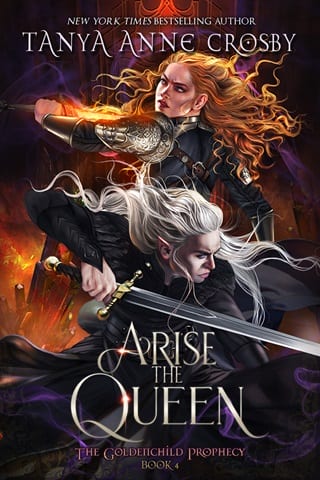Chapter 5
5
U nlike Lir, no matter how much the Púca seemed to wish to enlighten her, he did not provide straightforward answers. As with Esme, nothing ever spoken was said by mischance. Every story held a deeper meaning, and there were hidden messages in all his revelations. The task she now faced was to determine how these pieces all fit together.
"Were the fogous always so gloomy?" Gwendolyn asked, chatty as he. It wasn't difficult to understand why anyone would be so disenchanted with this place. It was nothing at all like those stories she'd been told as a child, or any of Lir's wondrous accounts.
"At first," he said. "Even Tír na nóg was this way."
"The City of Light?"
"Crag and waste."
Gwendolyn furrowed her brow. "Then why build a city here, but not in the Forbidden Lands?"
He gave her a look that said, "Stupid Girl," even if he didn't say it aloud.
And nevertheless, he explained everything—how the earth shook as one grew close to the red-glowing passages. The Fae settled there, initially, only to be closer to the Lake of Fire beneath Mount Slemish. But no matter how many times they'd attempted to rebuild the city, every tremor left it in ruins—a fact no Fae appreciated, despite that their city was not constructed through grueling labor, but through Fae magic. Even so, they'd blamed what they perceived as a curse upon the loss of their sacred relic, and their hatred turned to the old king, despite that they had all mutually agreed to build this city near the mines that were the reason for their sojourn to ériu—to be closer to the adamantine, which, according to the Púca, was depleted in their homeland. Eventually, they grew so disenchanted with the fate dealt them, they put their faith in the old king's rival and installed this new king upon the Tuatha'an throne.
Gwendolyn listened intently, feeling the old king's pain acutely—naturally, because it was her father the people had blamed when their own lands turned to Rot. And then, once her father was gone—their once-beloved champion—they'd blamed Gwendolyn, despite that they never gave her the time to effect any change.
They reviled her, and presumably so, too, did the gods.
Why else would they favor Locrinus?
Feeling sorry for herself, she wondered why she bothered when Locrinus found it so easy to win her people's hearts. Truly, she thought, did they even deserve her care? Why was she fighting so hard for people who seemed so ready to reject a woman in favor of a man?
And once again, Gwendolyn wondered how Brutus had ended with that alloy instead of her father. Hadn't Corineus presided over Pretania long enough to prove his worth? Why hadn't the gods provided him the means to fashion Loegrian steel? Why had this Outlander received the gods' favor?
She tried to remember what Locrinus had told her about ériu during their ill-fated Promise Ceremony—only that he'd met the Ostmen on his journey home from ériu on a ship captained by a helmsman from Hyperborea. And that was the first time she'd ever heard the name Hyperborea—she'd thought him so worldly. But he'd never actually explained where this place was, nor that it belonged to the Tuatha Dé Danann.
Gwendolyn would have remembered that.
It was Lir who'd explained that the realm the Fae now occupied was not the land of their origins, that their motherland was this land called Hyperborea. It was, he'd said, a land of great riches, where death, disease and sorrow could not exist. But if that was so, why then did they set their sights on ériu? Only to mine this alloy?
But then, why would they not return to their beloved homeland after losing the Last Battle instead of accepting this dark, oppressive realm as their fate?
"What can you tell me about Hyperborea?"
"Nothing," said the Púca, sounding annoyed. He lifted two fingers as though to pinch his thin, black lips together. "I've said too much already."
And despite this, he immediately carried on at great length, illuminating Gwendolyn next about how the Fae built their new home in a new city called Tír na nóg—the City of Light Lir had spoken of. According to Lir, that city was a marvel to behold, and the Púca confirmed this. Apparently, no mortal city compared.
The stronghold at its center, unlike Trevena, was truly an impenetrable bastion. It was one thing, said the Púca, to enter that city, but the court itself was warded, so only the reigning king and his royal household could enter without permission. It was there that Dagda's cauldron was kept, along with several other treasures that remained on display for the city's elite—a reminder of the power this new king wielded. According to the Púca, even Locrinus' army, ten thousand strong, couldn't breach this city, and thus, Gwendolyn's tiny retinue had no hope. Her only chance lay in the King's invitation—if she could wrest one.
So much for stealth or force.
"What illuminates the city?" Gwendolyn asked, wondering how any light could penetrate this eternal gloom. But she frowned when the Púca gave her a response not unlike the one Málik gave her when she'd asked about Hob cake.
"A wodge of hope, a pinch of slag, and a cauldron-full of scoria."
Gwendolyn scrunched her nose, trying to imagine this strange concoction, and once again, she furrowed her brow because she'd once asked Málik what a wodge was, to no avail. More than a wedge, he'd said. Less than a podge.
"Sometimes more, never less," the Púca continued, as though he'd read Gwendolyn's thoughts, and again, she was left with more questions than answers.
What was slag? How did one gather hope to dole in portions?
More than anything, she would like to know the answer to these questions—especially if a wodge of hope could be her people's salvation.
How much hope was enough to turn the people's hearts?
"Of late, the city's brilliance has faded," revealed the Púca, this declaration worming its way into the cheesecloth of Gwendolyn's brain. "The Darkening has roused unrest and there are those who wish to see the Rightful Heir reclaim the throne."
Gwendolyn's attention now perked. "Málik?"
The Púca turned, pressing a finger to his lips. "Shhh."
Gwendolyn frowned over his response. "And you?" she persisted, undaunted, knowing that soon enough he would morph back into his cat form, and she would hear no more about anything until it pleased him. "I only wonder, do you sympathize with the?—"
"Shhh!" said the Púca again, this time much more forcefully, and he turned with a finger to his lips and a sharp glimmer in his obsidian eyes. "Never, ever speak that word!"
Gwendolyn's frown deepened. " What word?"
Unexpectedly, the creature bared his teeth—teeth that were not so much porbeagle, but still quite sharp. And then he hissed at her.
Rebels, she had been about to say, but how could he have known this?
And no matter, heeding the warning she'd spied in his eyes, Gwendolyn allowed the word to drift away, like a wind-blown leaf seeking purchase and finding none.
Later, she wondered if the dimming of Tír na nóg was like her Rot, fueled by despair. Esme had once claimed there were lands where the ysbryd y byd was not affected by Pretania's trials, but it went without saying—and Gwendolyn had proof of this besides—that there were also many places that must be similarly affected by their own trials. And perhaps the Fae and mortal worlds were also connected by some means Gwendolyn had yet to determine.
If so, could this be why Esme had come to Gwendolyn's aid?
Could Gwendolyn help the Fae? Was that the secret Esme was keeping from her father? Was Gwendolyn the key to saving both Fae and mortal kind?
Or perhaps their discontent was more simply related to the lack of adamantine and their lack of proximity to this Lake of Fire?
Whatever the case, Fae politiks were not hers to fix or change, and Gwendolyn had far more pressing matters to contend with. She did not come to change life for these Fae. She came to fix her own lands and people, not meddle in Fae affairs.
It was well and good to listen to the Púca's stories, but she needed only to apply them where it served her, and this must be, foremost, to find some way to collect her sword—the one thing she most needed to convince Baugh to follow a granddaughter he'd never bothered to know.
Gwendolyn sighed then, considering her grandfather.
She couldn't help but think about her mother as a child. Did they miss her not at all? Did they wonder about her offspring? Would they be pleased to learn their grandchild lived, or did they even know there had been a coup?
Surely, they must, though, after so many months, and no word from the Prydein Confederacy, and nothing from Caledonia, Gwendolyn only prayed it wasn't for lack of care that her grandfather's people had not ridden to her aid.
More than anything, she wished to believe that her own flesh and blood would champion her when asked, and that the sword would only be proof that her plight was that of the Righ Art, the High King of this land.
As for her mother… Gwendolyn hadn't had the first moment to consider what it meant that Queen Eseld was alive. She only had the wherewithal to take heart in that she might now have the chance to make things right with the woman who gave her life.
Gwendolyn longed to hug her mother again. It no longer mattered to her whether Queen Eseld returned this affection, or whether she criticized Gwendolyn's smile, or hounded her to live up to some measure of excellence she feared she could not.
None of that mattered.
The only thing that truly mattered was that Gwendolyn sorely missed her, and she must now keep the faith that Esme intended to honor the spirit of their bargain, even if she'd not kept her word.
Alas, even if Gwendolyn won against this Fae king, who was to say Esme would ever reveal her mother's whereabouts? Fae did not lie, but Esme wouldn't have to twist words to keep from revealing the truth. She was quite adept at disappearing when it suited her. But, at the moment, this was neither here nor there.
Come what may, Gwendolyn could not turn her back on this quest. But even if she could, her fate was sealed the moment Málik shoved her through that portal.
There was only one way out of this place…
But even that was uncertain.
 Fullepub
Fullepub 



